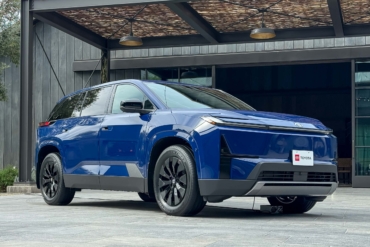A sensor in the Rivian R1T front passenger seat may be calibrated incorrectly. If that’s the case, airbags in the affected vehicles might pose a higher risk to children or infants.
This month, Rivian recalled 502 R1T electric trucks from a recent production run. According to documents made available by the National Highway Traffic Safety Administration (NHTSA), the problem revolves around a sensor in the front passenger seat.
Per the documents, the occupant classification system (“OCS”) in the seat may be calibrated wrong in the affected vehicles. If so, the airbag could introduce higher danger for children or infants seated there during a crash.
Rivian Safety Recall
Rivian’s investigation into the issue began in March. The electric SUV and truck maker is not aware of any injuries or accidents related to it as of now. It will repair the affected vehicles by replacing the passenger seat in the affected vehicles free of charge.
Until the repair is complete, Rivian urges customers not to seat children or use child seats in the passenger seat of the affected vehicles. Rivian will communicate more details to affected customers via emails, texts, and in-vehicle messaging on the center display. Mail notifications will be issued on or before July 1.
The documents say that the defect, which stems from supplier manufacturing, causes the OCS to “not perform consistently.”
Affected vehicles include R1Ts sold between September 21, 2021, and April 12, 2022. The NHTSA documents “estimate” that 100% of vehicles in the recall display the defect.
Owners may be able to detect the malfunction themselves.
“The customer may be made aware of the status of the passenger restraint system by the illumination, or lack thereof, of the PASSENGER AIRBAG OFF lamp in the lower corner of the center display. In some circumstances, the passenger seat belt notification may chime when the seat is empty,” the documents said.
The decision to recall the vehicles relied on the supplier’s seat manufacturing records, seat calibration data, and Rivian component traceability information. Per the documents, similar vehicles not included in the recall (with properly calibrated OCS) were identified.







